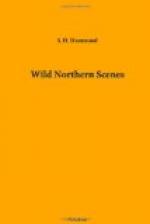The sounds that come upon the ear during the night in a far off place like this, are peculiar. The old owl hoots mournfully, the frogs bellow hoarsely along the reedy shore, while the tree toads are quavering from among the branches of the scrubby trees that grow along the rocky banks; the whippoorwill pipes shrilly in the forest depths; the breeze murmurs among the foliage of the tall old pines, while the everlasting roar of the waters, as they go tumbling down the rocks, is always heard. However diversified these sounds may be, they all invite to repose. They fall soothingly upon the ear, and though all are distinctly heard, yet strange as it may seem, there is a strong impression upon the mind of the deep silence pervading the forest. This impression is doubtless occasioned by the utter dissimilarity between the voices one hears in the day, from those which fall upon the ear in the night time. The former are all joyous and happy, full of gladness and merriment, full of life and animation; the latter solemn, deep, profound, lulling to the senses; not sorrowful nor sad, yet still such as form a calm and quiet lullaby, under the influence of which one glides away into slumber, and sleeps quietly until dawn. Then the voice of gladness breaks so tumultuously on the ear, that he must be a sluggard indeed who can resist their wakening influences. How beautifully the sun went down behind the hills, lighting up the western sky, and the fleecy clouds floating in the heavens with a blaze of glory, throwing a mantle of silver over the tall ranges and mountain peaks that loomed up in solemn grandeur away in the east; and how stilly, silently the stars came out from the depths above, and how brightly and truthfully they were given back from away down in depths beneath the placid waters. We had taken half a dozen beautiful trout from the foot of the falls where the current shoots out into the lake. We had eaten them too, and were sitting in front of our tents smoking our evening pipes.
“Spalding,” said the Doctor, “How I wish our little boys were out here with us. How they would enjoy themselves among these lakes and rivers. It is a hard lot that the children of our cities have in life. They struggle up to man and womanhood against fearful odds, and the wonder is, that they do not perish in their infancy; that they are not blasted, as the blossoms are, when the cold east wind sweeps over the earth.”
“You are right, my friend,” replied Spalding. “I should like to have our little boys, and girls too, for that matter, with us for a few days out here on these lakes. It would be a lifetime to them, measuring time by the enjoyment it would afford them. Still their city habits might make them tire of this freedom in a week. You and I enjoy it longer, because it brings back old memories and relieves us from the toils of business and the restraints of conventional life. You are right too in saying that the lot of our city children is




